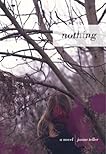 Nothing by Janne Teller
Nothing by Janne TellerMy rating: 4 of 5 stars
Pierre Anthon, a 14 year-old-boy, stands in the middle of a class and announces, "Nothing matters." He walks out of the classroom to sit for most of the rest of Dutch author Janne Teller's YA novel nothing in a plum tree.
And so the existential journey begins for the twenty classmates who witnessed Pierre's proclamation and pass him every day on their way to school as he rains plums at them with the reminder that nothing matters.
Twenty classmates find themselves hell-bent on proving to him and to themselves that something matters--and they hatch a plan. If they can each contribute something that matters from each of their lives, and completely give it up for good, then they can show Pierre Anthon that he is wrong and something does indeed matter.
The twist in their plan is that someone else chooses for each of them. For instance, one child told the narrator that she must give up her favorite pair of casual footwear (green flip-flops). This one hurt as the flip-flops were her favorite, but she gave them up nevertheless. The point is, if someone else chooses, and you can't refuse, then we are bound to find things in others which are painful to lose and therefore...meaningful.
They continue to pile their personal belongs together, one by one, in an abandoned sawmill. As we move through the story, each item becomes increasingly cruel and personal...and painful...and, according to the philosophy of their journey--meaningful. The choices the adolescents come up for each other with are eye-opening: forced mutilation, animal cruelty, exhumation, desecration of religious items, loss of sexual innocence, and homicide.
I've read often that the writer's job is to be cruel to his/her characters...well, Teller certainly abides by that formula. It would also come as no surprise to find people offended by at least one of the actions by the characters in this novel. I'm reminded of a time when a perturbed colleague tried to engage me in a debate about a Robert Mapplethorpe photograph which offended him: the crucifix submerged in a jar of urine. Teller's novel can be perceived as just as evocative especially considering it is for the YA audience.
Personally, I found the novel fascinating and very difficult to put down as this existential journey hurtles with skilled recklessness towards the conclusion. The themes in nothing resonate with echoes from The Lord of the Flies, The Catcher in the Rye, A Wrinkle in Time--all have been challenged by communities. The novel most likely will find some resistance in public school libraries and classrooms should it ever enter those domains, but I'll stand by my opinion that Janne Teller's nothing would make for some heady and healthy discussion with adolescents--just the opportunities for higher order thinking alone...yet, I can't put it in my classroom. Nevertheless, I am glad that I read it and am aware of it in case the opportunity to discuss it ever arises.
View all my reviews


What do you think about the definition of "meaning" in this book? It seemed that the book was defining it only as something that is lasting or popular among people. That's what I found frustrating about this story, is that there was no other aspects of "meaning" that were explored, both by the message and the characters.
ReplyDeleteA fair question--I think if we were in a book group or posed your question to a class of students that there would be some differences of opinion.
ReplyDeleteUltimately, there may not be an answer and my gut response to your question I'm not so sure that I want a definition of "meaning" from this book.
Personally, art and literature is most appealing when it asks great questions or forces us to ask great questions. I don't want answers per se from my art or reading experiences.
The definition of "Meaning" as it relates to the statement "nothing matters" completely baffles the young people of the story, and it is this wrestling for "meaning"...their struggle with finding tangible and then intangible things...which appeals to me.
I think the core of your question which has to be addressed is who is to say what has meaning in one's life? Perhaps that is best left to the readers to think for themselves. Remember, the kids set up their experiment with the idea that someone else selected what has meaning...so, of course, from the perspective of some young people that might something which is lasting or popular as you explain it.
Most YA books leave the young people to sort through their problems and keep the adults on the sidelines. I think if we were to have other aspects of meaning in the book then it would have to be from a really mature YA character or an adult. Pierre Anthon's existential eccentricity weighed so heavily on the young characters (and readers) that I think the book might not have worked if there was also an additional grown-up perspective.
I hope I left you with something to think about--I liked your question as it made me think about a specific element of the book which I hadn't considered.